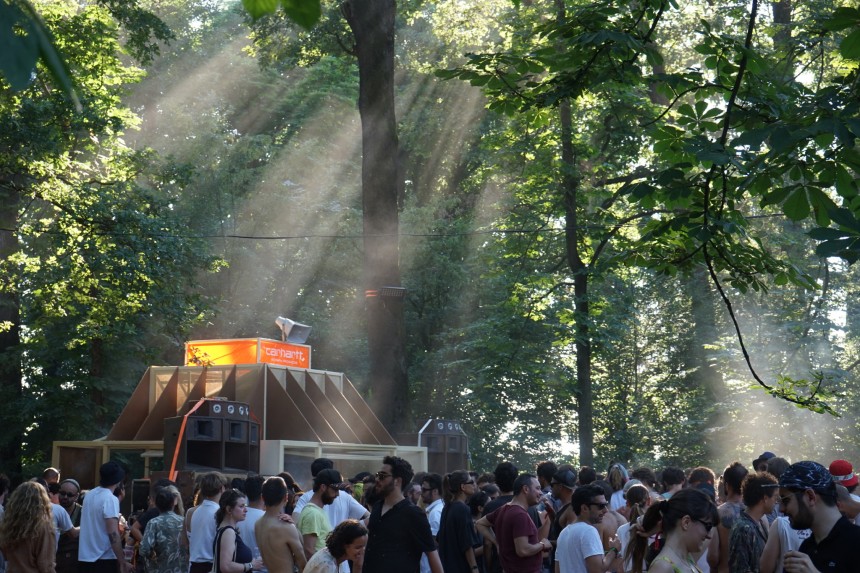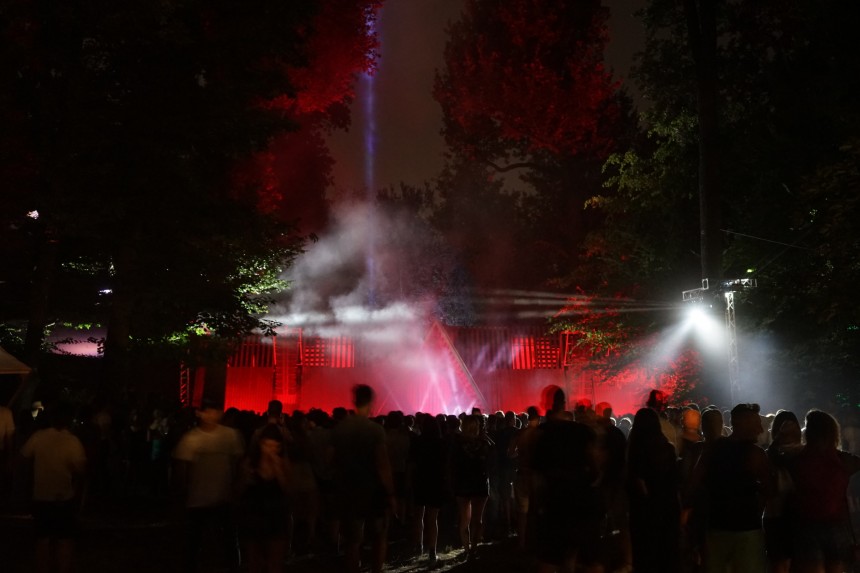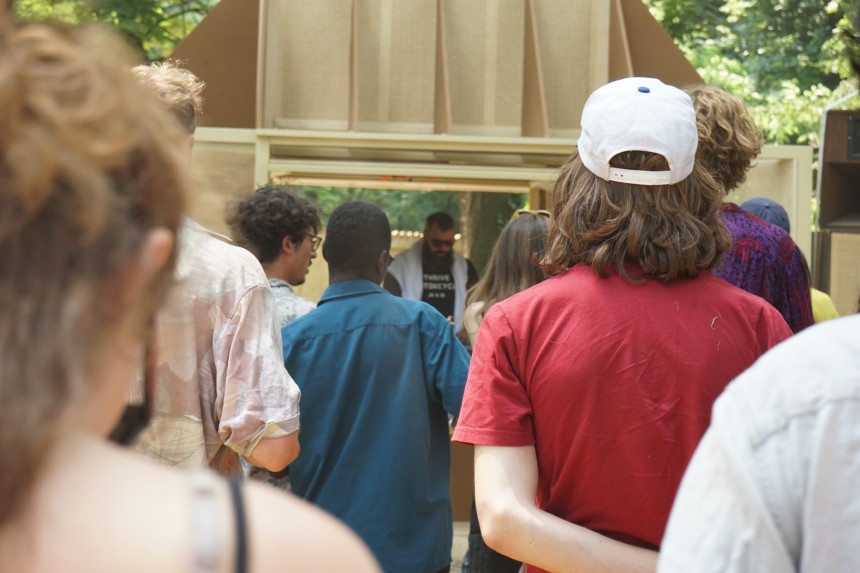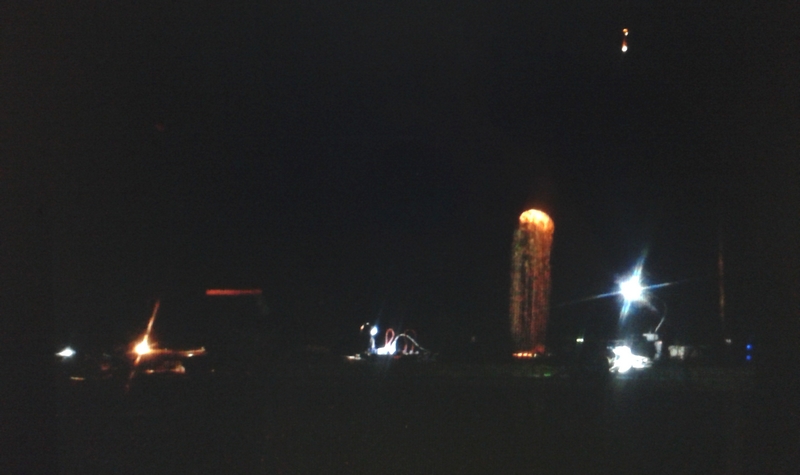Terraforma2018 – A festival of superior, sustainable bliss (live report)

Terraforma Festival 2018, Milan, Italy, 29.06-01.07 – review by Sandra S. Borch. Photos by Delfino Sisto Legnani and Guido Borso
For the past four years Villa Arconti, a baroque rural palace just outside Milan, has been home for one of Europe’s most blissful festivals, Terraforma. First held in 2014 with a line up featuring Voices From the Lake, Pierre Bastien, and CB21, and later editions have included artists such as Suzanne Ciani, Mark Ernestus, Millie and Andrea, Aurora Halal, and Rashad Becker. The artistic programme celebrates music with an open-minded and experimental attitude across borders and genres. For its fifth edition the festival had the wizard from Detroit Jeff Mills, spokeswoman for the NON collective Nkisi, Rabih Beaini, Danielle De Santis, and many more. Here follows a selection of performances and thoughts on Europe’s newcomer among experimental music festivals.
You quickly understand what the fuzz is all about. The location and the surroundings are a complete blessing for the soul. The site offers a massive garden with green arcades, an arbour of hornbeam and small lounges offering a first class shade. Compared to other European festivals such as Dekmantel, Terraforma is a very small festival with kids running around during the daytime, and it almost seems like a family affair.
This year’s festival had four stages including the Planetary, which featured an astro-installation made in collaboration between the Italian composer Caterina Barbieri and the art collective Orthographe. Barbieri’s sound composition investigated the generative, cosmogenic power of sound. Besides this stage there was the Alpha stage, The Labyrinth and the Dummy Tent Sound System.
The first evening of the festival saw the new human-machine performance by Plaid & Felix’s Machines. The performance was set in the Labyrinth with Felix Thorn’s massive statue of machinery placed in the epicenter. The collaboration between the British duo and Felix Thorn started nearly five years ago and has morphed into a mixture of natural amplification and synchronized audio processing with mesmerizing paths of light and movement.
By the time the rest of the audience from the Labyrinth arrived to the Dummy tent Nkisi was already bashing killer track after killer track including Darkraver’s “Komt Ie Dan He”.

Jeff Mills, photo by Delfino Sisto Legnani
Nevertheless the night belonged to Jeff Mills. With a full moon and Jupiter rising above the Alpha stage, the night was a holistic travel in time. It almost seemed staged that the universe would serve Jeff Mills this scenographic setting. Mills built his career on inspiration from science-fiction which you can experience in his composed soundtracks for films such as “Fantastic Voyage”, “A Trip to the Moon” and “Metropolis”. He has also made a symphony dedicated to the celestial world titled “Lost in Space” and last year saw his radio program, Outer Limits, which he made in collaboration with NASA. With this in mind everything came together. Mills was doing what he does best crafting a lavine of loops and textures and just a bit over half way through his three hour performance he dropped the well-known tones of “The Bells”. The Alpha stage then cranked up, and the crowd cheered continuously as he travelled further beyond.
Terraforma tailors a festival by curating not only a programme, but also a schedule, which seems to be a lost art form for many festivals and places. This means that the artists are scheduled according to what is best suited for a given time. So, high profile names such a Marco Shuttle, Konrad Sprenger and Donato Dozzy played some of the earliest slots, and upcoming names such as Powder closed down the main stage with superiority.
The final day began with Danielle De Santis showing his expertise of the drums. He started out with fine brushes on the drum, looped it and added extra layers with different tools. By witnessing the process of his fine-tuned layering you notice what it takes to make music sounds this way and do not just take it for granted. It becomes layers of patience and details and not just noise (in the word’s non-musical meaning).

Rabih Beaini, Photo by Guido Borso
De Santis’ sounds smoothly melted into Rabih Beaini’s set. Beaini is known for many things but above all he is notorious for uncovering the best of the musical past, present and future in a mixture of avantgarde and folklore, oriental rhythm and chants mixing choirs with robot voices. Rabih Beaini played for an audience who recently had woken up, setting the mood perfectly for a easy start of the day and into a sunny afternoon of spacey records. Even the alienated robot voice seemed natural and organic and smoothly integrated into the garden. He varied between tracks like “West Java-Mamaos (Sundanese)” by Many Eppen to “Radiator” by Container. When the Container track hit the stereo, the audience immediately adopted into what looked like proper hands-in-the-air moves. Rabih Beaini ended his set on a high with Gelegah Mani’s version of “Kebyar” by Terompong Beruk & Gong Kebyar. Later, Don’t Dj was on, then came Vladimir Ivkovic, and by the time Plo Man took over the Dummy Tent, everyone was back in full force, and the festival ended in one big party beneath the stellar-views, green trees and the lights from the disco ball.
As beautiful as the inside of an abandoned factory or a dusty basement may be, there’s really not much that beats the blue sky and surroundings taken out of a merry fairytale. Within the mist of city-park weekenders, food and music and silent discos, Terraforma is a good reminder of why putting music outdoor is a good idea. The dialogue between artist and setting is ever present. Whether it was De Santis’ drum rolls or Jeff Mills’ lunar affair, all performances seemed to be site-specific. The festival works with a programme around its site, and the result is remarkable, balancing between impact and event, and making the maximum impact on musical experience and minimum impact on nature. The manifest of Terraforma is admirable, and we can only wish for everyone taking the same environmental responsibilities as Terraforma.
Even though the festival promotes sustainability and respect for the environment, if you take a glimpse at the previously line-ups and the 2018 bill, you stumble upon how few female acts are represented. This is something that is definitely not sustainable in any environments or perspectives.



